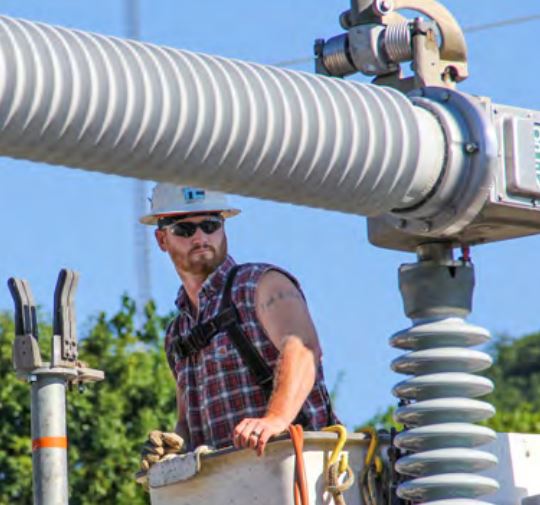Tyler Manship has spent more than 21 years as a lineman, 16 of those with Hoosier Energy, so he’s seen good days, bad days and most everything in between.
This past November, Manship was promoted to Transmission and Training Safety Specialist, stepping into the shoes of Kevin Burch. Manship recently spoke with GridLines about his experience, his new role and more.
Q: Tell us a little bit about your work history – how did you wind up at Hoosier?
A: I started out at Orange County REMC for four and a half years, did a brief stint in Texas for the Lower Colorado River Authority and then have been here since 2006. So most of my career has been here, but I’ve been other places.

Then-line specialist Tyler Manship works to connect components at a substation. Manship is now Hoosier Energy’s Training and Safety Specialist.
I wasn’t down in Texas very long and somebody from Hoosier reached out about an opening in English. Back then the hiring process was a little different. I was hired on a Sunday, and then they wanted to know, ‘How fast can you get back up here?’ It definitely wasn’t a slow application process.
I was a line specialist at English, then became acting line foreman for a while before being asked to take Kevin Burch’s place as a training and safety specialist.
Q: How has that transition been?
A: Well, I started the new role on Nov. 21 of last year and had a lot to pick up in a short amount of time. Kevin, who has really changed the culture during his time, has helped out, but I’ve been more and more on my own as time has progressed.
I’d definitely be hung out to dry without Kevin’s help, but I’ve been here a long time, so I know a lot of the processes. It would be different if I was coming into a new company, but stepping into Kevin’s role with his history here and my history here, that helps a lot.
Q: What’s the biggest benefit for you with having that history with Hoosier Energy?
A: I have a lot of history with these guys who are out in the field working, so they know who I am. I can’t pretend I’m somebody I’m not, because they already know.
I’ve seen us do thing the right way and do things the wrong way, and they know that, too. We’ve tried to fix a lot of those things, but ultimately, I just want to help them do their job as safely as they can and go home every night.
Q: Safety is always important, but it sounds like it hits especially close to home for you?
A: I hope I can relate to what guys need, what they’re going through, help them do anything to process work safer.
I’ve been hurt pretty bad out there, so I have perspective on that. I laid in a hospital bed for three days, but I also know guys who have gotten killed.
The dangers are real. I really don’t think most guys lose that perspective, but sometimes there are things you just can’t see. Fortunately, there are a lot of things you can see. We try to engineer everything out we can, and I want to be an advocate for the employees to the company, to help them work safe, follow safer processes and use the safest tools we can get.
Q: To that end, how does reporting catches and near-misses benefit everyone?
A: Reporting those things is not going unnoticed, and it’s getting the word out to other areas to be aware, to say, ‘Hey, we’re finding this, you might too.’
It’s also important for guys to know they can report things without getting anyone in trouble. That’s not what it’s about. We just want to promote safety, and if it can promote our guys in a good way, even better. And I know they appreciate that.